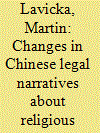| Srl | Item |
| 1 |
ID:
177581


|
|
|
|
|
| Summary/Abstract |
Policies introduced by the Chinese government in the name of fighting terrorism, religious extremism and separatism have significantly reshaped the Xinjiang Uyghur Autonomous Region (XUAR) – even though securitization has not brought the ‘stability’ that the PRC government claims in its continuous defense of its policies. Analysis of Chinese legal documents can provide a clearer picture of the government’s intentions in the region, since they are almost free from the propaganda ballast abundant in Chinese policy documents. This article analyses recent amendments to two legal documents, the Religious Affairs Regulations and the Regulations of Xinjiang Uyghur Autonomous Region on Religious Affairs. It discusses why certain articles were omitted, modified or added and what this can tell us about the situation in China and in particular in Xinjiang. It also suggests that Xinjiang has been a testing site for national religious policy, not just new surveillance methods.
|
|
|
|
|
|
|
|
|
|
|
|
|
|
|
|
| 2 |
ID:
193181


|
|
|
|
|
| Summary/Abstract |
With the incorporation of the State Administration for Religious Affairs (SARA) into the Chinese Communist Party’s (CCP) United Front Work Department in 2018, religious affairs have been brought back into the direct control of the Party. While SARA has retained its name, it is no longer an independent state agency. Five further legal measures were introduced from 2019 to 2021. This review essay examines these legal changes in order to update the dominant understanding of Xi Jinping’s attempt to reshape religious order in the hands of the CCP. The specific creation of regulations on Islamic affairs and the Internet also responds to Xi’s perceived problems regarding religious affairs in the contemporary era. Under the new measures, the state has demanded clear administration of religious groups, creating functions and positions like those in the Party’s branches. Beijing has further increased its control over religious personnel by establishing files on each of them, including details of any misconduct, in order to assess their trustworthiness. This essay concludes that the CCP continues to work toward the final eradication of religions in a Marxist manner and that China’s practices differ from existing international legal norms to which, at least nominally, China adheres as a signatory.
|
|
|
|
|
|
|
|
|
|
|
|
|
|
|
|